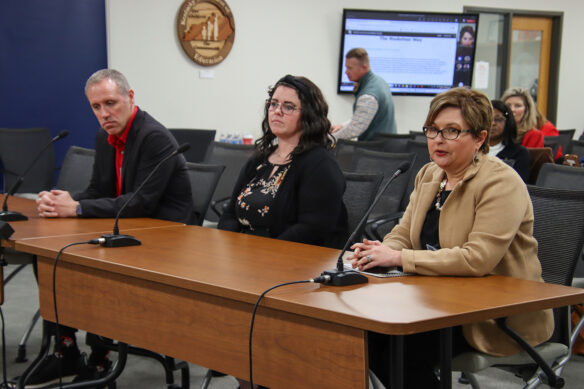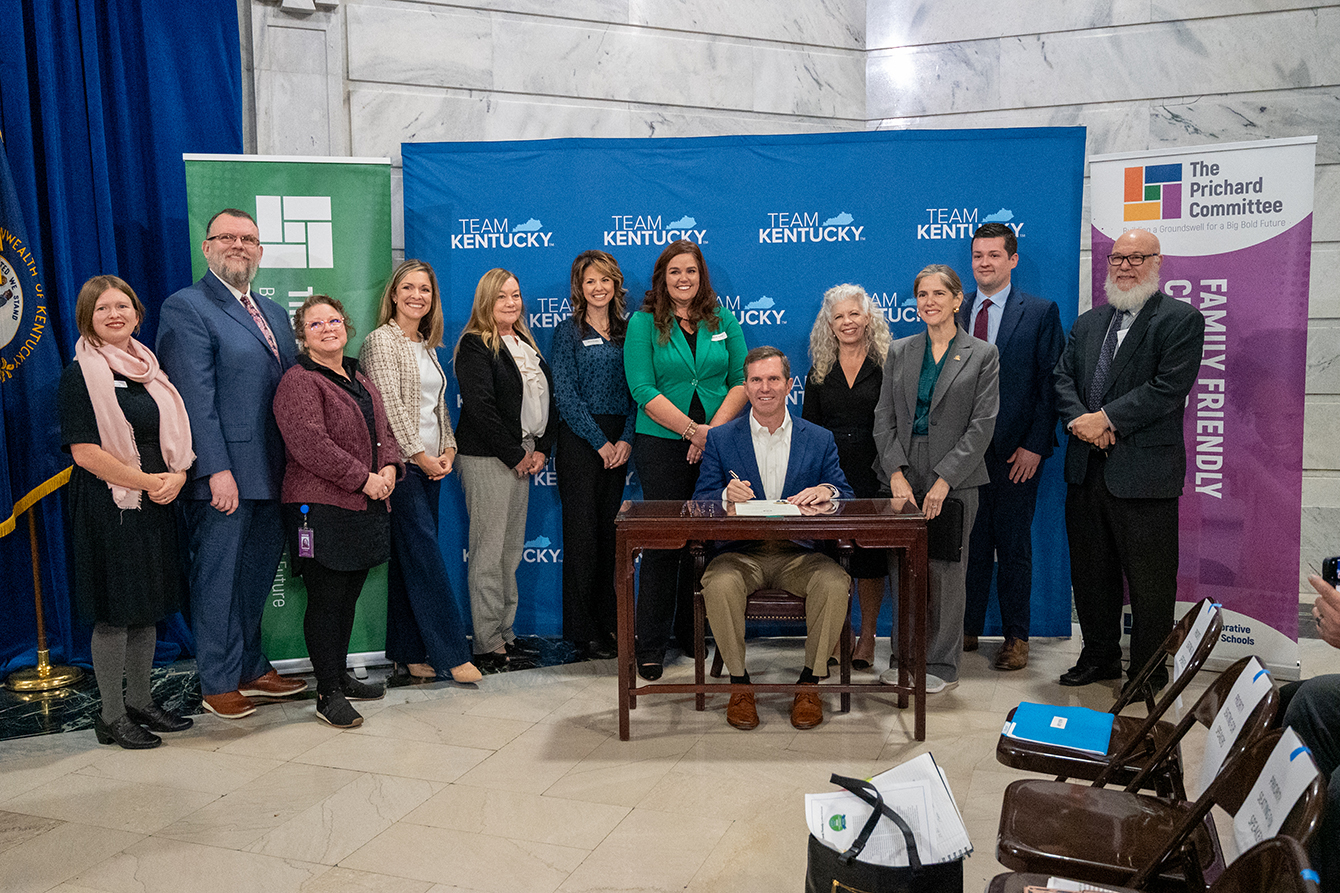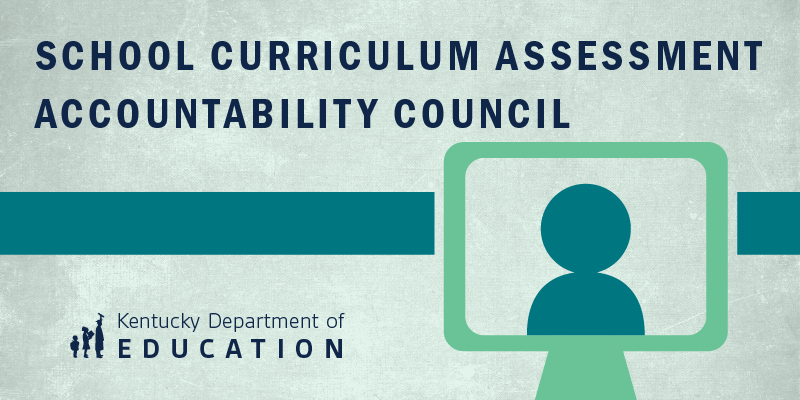
Kentucky Board of Education members Steve Trimble (front), R.J. Osborne and JoAnn Adams listen to a presentation during the KBE meeting on Dec. 7. Photo by Joe Ragusa, Kentucky Department of Education, Dec. 7, 2023
Kentucky Board of Education (KBE) members discussed how the adoption and implementation of locally developed portraits of a learner can serve as catalysts to transform the student experience for every Kentucky learner during the KBE meeting on Dec. 6-7.
A portrait of a learner is an agreed-upon set of aspirations for what every learner will know and be able to do when they leave school. Portraits of a learner are designed to give school leaders and teachers a framework to design instruction in a way that promotes real-world competencies to ensure students are prepared for successful entry into a complex and ever-evolving global landscape.
Interim Commissioner of Education Robin Fields Kinney said the plan to promote the adoption and implementation of local portraits of a learner is coming together, but discussions will need to be deliberate.
“We have to keep having that conversation so that we make sure that everyone understands the importance of portraits of a learner, how we implement (them) and how (they) will benefit our students,” she said.
Kentucky has 94 school districts that have either finalized development of a local portrait of a learner or are developing one.
KBE Chair Sharon Porter Robinson said making the student experience more engaging and aligned with the needs of today’s learners, is the “tip of the iceberg” when it comes to student achievement, especially as it relates to chronic absenteeism.
“We’ve got to support our students with a sense of efficacy and legitimacy,” said Robinson. “We’ve got a lot of students we need to coax back into the learning experience, both formally and informally, because it is engaging for them and it speaks to them as a participant in a future that they can imagine.”
Local Laboratories of Learning
Board members heard an update on the Local Laboratories of Learning (L3) project.
The L3 work is happening in conjunction with the United We Learn philosophy of creating vibrant student experiences, encouraging innovation and community collaboration.
These community-based partnerships aim to create a more equitable future for education in Kentucky through an inclusive co-design process between school districts and the community. Through these efforts, districts and community members have been creating a system of assessment and accountability that reflects the diversity of the students, families and communities.
A total of 18 districts were selected to be L3s, and representatives from Logan and Greenup counties shared their experiences with developing a local accountability system.
Greenup County has a community-driven design process with multiple teams of different community members coming together to create “The Musketeer Way,” the district’s new accountability model.
“Conversations are the key to making those connections and finding out what people really need,” said Traysea Moresea, superintendent of Greenup County.
The model is centered around the Profile of a Musketeer, which takes inspiration from the Kentucky Statewide Portrait of a Learner.
Moresea said they brought in a mix of family members, educators and regional employers who were all focused on how the school district is producing productive community members, not just students who can pass a test.
“We built some amazing relationships and because of that, we’ve been able to put students straight into work, even sometimes during the school day,” said Moresea.
Logan County took a similar community approach to devising its accountability model, called it the “Profile of Success.” It focuses on four competencies labeled the “Pillars of Success”: performance, readiness, growth and well-being.
“It really goes a little deeper than even what a state assessment would look at, typically,” said Joshua Matthews, chief academic officer for Logan County.
Matthews said there have been plenty of hurdles, but the process has been worth it.
“This is the next step if we want to grow students and we want to make them truly college- and career-ready, truly ready for the real world. This is how you do that,” he said.

Greenup County Superintendent Traysea Moresea (right) discusses her district’s experience as a Local Laboratory of Learning (L3) along with KDE Division of Innovative Learning Program Manager Sarah Snipes and Logan County Chief Academic Officer Joshua Matthews. Photo by Joe Ragusa, Kentucky Department of Education, Dec. 6, 2023
Vision and Mission Statements
During the meeting, members of the KBE finalized a vision and mission statement.
“I really felt that the board’s in-depth deliberations were thoughtful, substantive and sincere,” said Robinson.
The new vision statement reads: “Each and every Kentucky learner will become an engaged citizen and empowered learner prepared to lead a life filled with purpose.”
The new mission statement reads: “Improve the future of all Kentucky learners by providing leadership, advocating for resources, advancing policy, and cultivating community partnerships to ensure each and every student has equitable access to high-quality, lifelong learning.”
“I just think this is a mission statement that we can stand behind and get behind as we support what’s happening in our schools and our school districts,” said board member Diane Woods.
Comprehensive Districtwide Multi-Tiered System of Supports
KBE members approved amendments to 704 KAR 3:095, the use of response to intervention in kindergarten through 3rd grade.
Senate Bill 9 (2022), the Read to Succeed Act, amended KRS 158.305(2) to require KBE to promulgate administrative regulations to further define a multi-tiered system of supports (MTSS).
Micki Ray, KDE’s chief academic officer, said the goal is to promote targeted instruction and intervention based on universal screening and diagnostic assessment data that is tailored to meet the individual needs of students.
The proposed amendments define MTSS as a multi-level prevention system designed to maximize student achievement and social and behavioral competencies through an integration of universal instruction, assessment and intervention. Ray further noted that districts already are implementing student progress monitoring and reporting, but the proposed changes include a mechanism to monitor and report individual student progress to the family of each student that summarizes their academic skills, behavior and any intervention plans and services being delivered.
The new regulation also would require districts to submit evidence demonstrating districtwide implementation of MTSS by Oct. 1 of each year.
Many districts already have started implementing MTSS. Kentucky Teacher recently featured Franklin County, Letcher County, Clinton County and Daviess County and shared their progress with MTSS implementation.
In other business, the KBE:
- Finalized a contract with search firm McPherson and Jacobson LLC to coordinate the search for the next commissioner of education in the Commonwealth;
- Approved revisions to Kentucky Tech Policy224 regarding emergency medical treatment to allow area technical centers to maintain opioid antagonists and epinephrine on campus;
- Honored the winners of the 2023 Milken Educator Awards, Jacob Ball of Fayette County and Shane Baker of Warren County; and
- Awarded the 2023 Kevin M. Noland-Mary Ann Miller Award to Jennifer Ginn, assistant director in the KDE Division of Communications.
The full board meeting can be viewed on the KDE Media Portal archive.



Leave A Comment